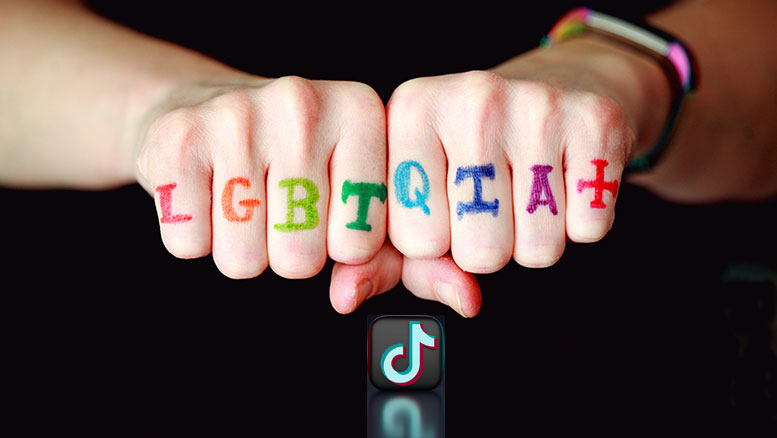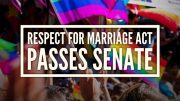After months of working behind the scenes with UltraViolet & GLAAD, TikTok unveils updated user policy to impede harassment, disinformation, misogyny, Anti-LGBTQ+ Hatred, Misgendering, disordered eating content, etc.
In an announcement today, the video-focused social media platform TikTok released an updated user policy now expressly featuring limitations on ‘misogyny’ and anti-discrimination protections for transgender people, including a prohibition on misgendering and deadnaming. TikTok also announced they will start to remove the promotion of disordered eating content, conversion therapy programs, etc.
TikTok implemented the changes after campaigns by UltraViolet, GLAAD, and other groups urged the platform to start taking more responsibility for algorithmic issues and protecting users.
“TikTok has become a little safer for women, girls, LGBQ, and trans people today,” said Bridget Todd, Communications Director at UltraViolet, a national gender justice advocacy group. “We applaud TikTok for responding effectively to our recommendations and implementing them into an updated, more protective user policy. Even so, it’s clear social media platforms have a long way to go across the board.
LGBQ+, Transgender, Women
“Social media is nearly ubiquitous in modern life. Which is exactly why we can’t allow social media companies to tacitly condone disinformation, racist, misogynistic, homophobic or transphobic attacks — today’s announcement suggests that TikTok executives agree,” added Todd.
“When anti-transgender actions like misgendering or deadnaming, or the promotion of so-called ‘conversion therapy,’ occur on platforms like TikTok, they create an unsafe environment for LGBTQ people online and too often lead to real-world harm,” said Sarah Kate Ellis, GLAAD President, and CEO. “TikTok’s move to expressly prohibit this harmful content in its Community Guidelines and to adopt recommendations made in GLAAD’s 2021 Social Media Safety Index raises the standard for LGBTQ safety online and sends a message that other platforms which claim to prioritize LGBTQ safety should follow suit with substantive actions like these.”
TikTok’s post announcing the new policies, written by Cormac Keenan, TikTok’s Head of Trust and Safety, explained where the company is headed with this update to their community guidelines.
“Though these ideologies have long been prohibited on TikTok, we’ve heard from creators and civil society organizations that it’s important to be explicit in our Community Guidelines, read Keenan’s post. “On top of this, we hope our recent feature enabling people to add their pronouns will encourage respectful and inclusive dialogue on our platform,”
The blog conveyed the main updates to the policy as stated via the blog and found below:
- Strengthening dangerous acts and challenges policy. “We continue to enact the stricter approach we previously announced to help prevent such content – including suicide hoaxes – from spreading on our platform. This previously sat within our suicide and self-harm policies, but will now be highlighted in a separate policy category with more detail so it’s even easier for our community to familiarize themselves with these guidelines. As part of our ongoing work to help our community understand online challenges and stay safe while having fun, we’ve worked with experts to launch new videos from creators that call on our community to follow four helpful steps when assessing content online – stop, think, decide and act. Community members can also view these videos at our #SaferTogether hub on the Discover page over the next week.”
- Broadening the approach to eating disorders. “While we already remove content that promotes eating disorders, we’ll start to also remove the promotion of disordered eating. We’re making this change, in consultation with eating disorders experts, researchers, and physicians, as we understand that people can struggle with unhealthy eating patterns and behavior without having an eating disorder diagnosis. Our aim is to acknowledge more symptoms, such as overexercise or short-term fasting, that are frequently under-recognized signs of a potential problem. This is an incredibly nuanced area that’s difficult to consistently get right, and we’re working to train our teams to remain alert to a broader scope of content.”
- Adding clarity on the types of hateful ideologies prohibited on the platform. “This includes deadnaming, misgendering, or misogyny as well as content that supports or promotes conversion therapy programs. Though these ideologies have long been prohibited on TikTok, we’ve heard from creators and civil society organizations that it’s important to be explicit in our Community Guidelines. On top of this, we hope our recent feature enabling people to add their pronouns will encourage respectful and inclusive dialogue on our platform.”
- Expanding the policy to protect the security, integrity, availability, and reliability of the platform. “This includes prohibiting unauthorized access to TikTok, as well as TikTok content, accounts, systems, or data, and prohibiting the use of TikTok to perpetrate criminal activity. In addition to educating our community on ways to spot, avoid, and report suspicious activity, we’re opening state-of-the-art cyber incident monitoring and investigative response centers in Washington DC, Dublin, and Singapore this year. TikTok’s Fusion Center operations enable follow-the-sun threat monitoring and intelligence gathering, as we continue working with industry-leading experts to test and enhance our defenses.”
In the coming weeks, every member of the TikTok community will be prompted to read the company’s updated guidelines when they open the App, according to the post.
Previous Updates
Late last year, the groups released a set of policy recommendations to provide solutions for how social media companies can improve their platforms and avoid discrimination toward women, people of color, and the LGBTQ+ population. The letter was endorsed by 75 groups and included recommendations, such as:
- Enforcing and implementing anti-harassment and discrimination policies
- Expanding the definition of hate speech
- Stopping the spread of disinformation
- Providing support for victims of harassment on their platforms
- Shift internal culture, conduct anti-racist workplace trainings, and create policies
To view the letter and a full list of signers, click here: https://weareuv.us/feministnetletter.
[From News Releases & Excerpts of Updates From Other Sources].







